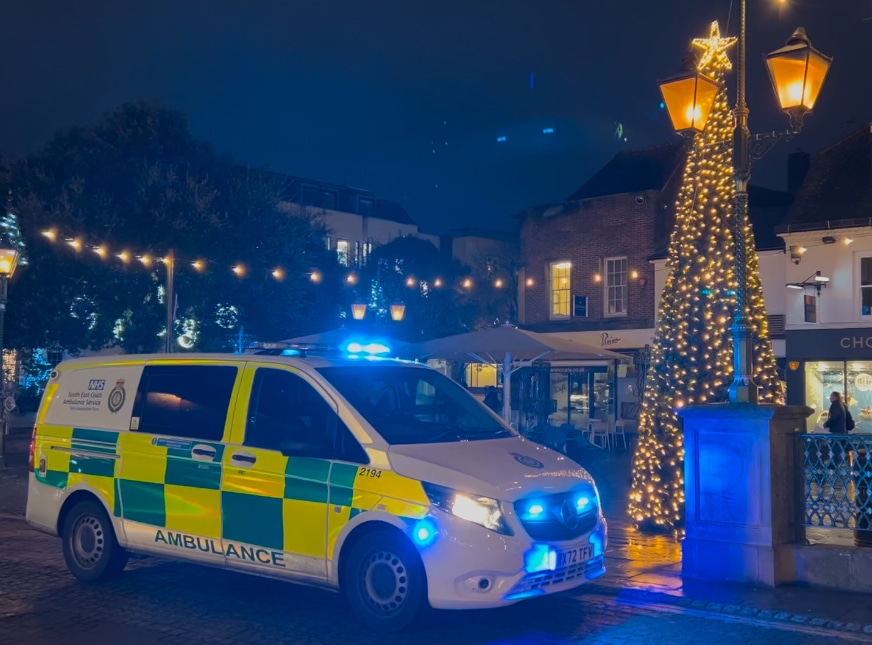
With a week to go until the big day, South East Coast Ambulance Service (SECAmb), is reminding members of the public to tick off a number of tasks to help keep them safer and healthier this Christmas and New Year.
People are urged to order any required repeat prescriptions and check that home medicine cabinets don’t contain out-of-date medication. The service is also asking people to check on vulnerable family and friends, familiarise themselves with local pharmacy opening times and make use of alternatives to calling 999 if not facing an emergency, including using NHS 111 online for help and advice – www.111.nhs.uk
SECAmb staff and volunteers will be working hard throughout the festive period, when it will handle in the region of 3,000 calls to 999 on its busiest days.
People are invited to learn more about the work of individuals and teams across its region with SECAmb’s 12 Days of Christmas Gifts feature on social media. Each day, from Christmas Day, it will be sharing a story of a ‘gift’ an individual from SECAmb has given to help others.
From providing life-saving CPR instructions over the phone, to delivering critical care at an emergency, each day an individual will share a compassionate story to highlight the amazing care taking place across its region every day of the year.
Throughout December, SECAmb is expecting to handle in the region of 90 thousand 999 calls and attend approximately 40,000 Category 1 and Category 2 999 calls – the two highest categories of call for its most seriously ill or injured patients.
The Trust’s NHS 111 service is also anticipating a busy period with calls expected to range from approximately 3,500 calls a day during the week to around 5,000 calls a day at weekends. Calls to the service, which SECAmb provides across Sussex and Kent, are expected to increase to as high as 8,000 at peak days over Christmas and New Year.
SECAmb Chief Operating Officer, Jennifer Allan said: “I would like to take this opportunity to wish everyone a safe and peaceful Christmas. By taking a moment and planning ahead in this last week before Christmas Day people can really help us and the wider NHS. Running out of prescriptions medicine can really increase the avoidable calls we receive, initially with people calling NHS 111 to arrange a prescription but also with people needing to call 999 due to a deterioration in an existing medical condition.
“We know that Christmas and the winter period can bring additional pressure on our services, but the public can help lessen the impact. In an emergency we’ll be there, but we’ll also be directing people to more appropriate services. I urge everyone to make the most of the alternative services available if it’s less serious, including speaking to pharmacist or by making us of NHS 111 either online or over the phone.”
SECAmb has a list of winter tips to help people keep themselves and others safe during the winter months.
SECAmb winter tips
- Take up the opportunity for flu and COVID-19 booster vaccinations when offered to protect yourself and others.
- Look out for any vulnerable family or friends – is there anything you can do to help them? Are there any hazards in their homes? Do their slippers need replacing?
- Wear appropriate shoes when outside especially during icy weather. We typically see an increase in slips and trips during colder spells
- Heat homes to at least 18C (65F). You might prefer your main living room to be slightly warmer
- Keep your bedroom at 18C all night if you can – and reduce drafts – if you’re under 65, healthy and active, you can safely have your home cooler than 18C, as long as you’re comfortable
- Keep active when you’re indoors. Try not to sit still for more than an hour or so
- Wear several layers of light clothes. They trap warm air better than one bulky layer
- Check your home medicines cabinet – is everything in date? Restock with essentials including cold remedies, pain killers, indigestion tablets and diarrhoea and constipation remedies
- Keep up to date with any repeat prescriptions you or your family or friends need – especially ahead of weekends and bank holidays
- When was the last time your vehicle was serviced? If your car is safer, so are you
- Carry some useful items in your vehicles such as a blanket and a spade for colder and possible snowy weather
- Wear bright colours at night. Can you be clearly seen as a pedestrian or cyclist? If walking at dusk or at night use a torch
- You should only call 999 in the event of a life-threatening or serious emergency
- People who are not facing a serious emergency should make alternative arrangements such seeking advice from a GP or pharmacist so we can focus on those who need us most. If its urgent but not an emergency you can call NHS 111 or seek advice from 111 online at 111.nhs.uk
